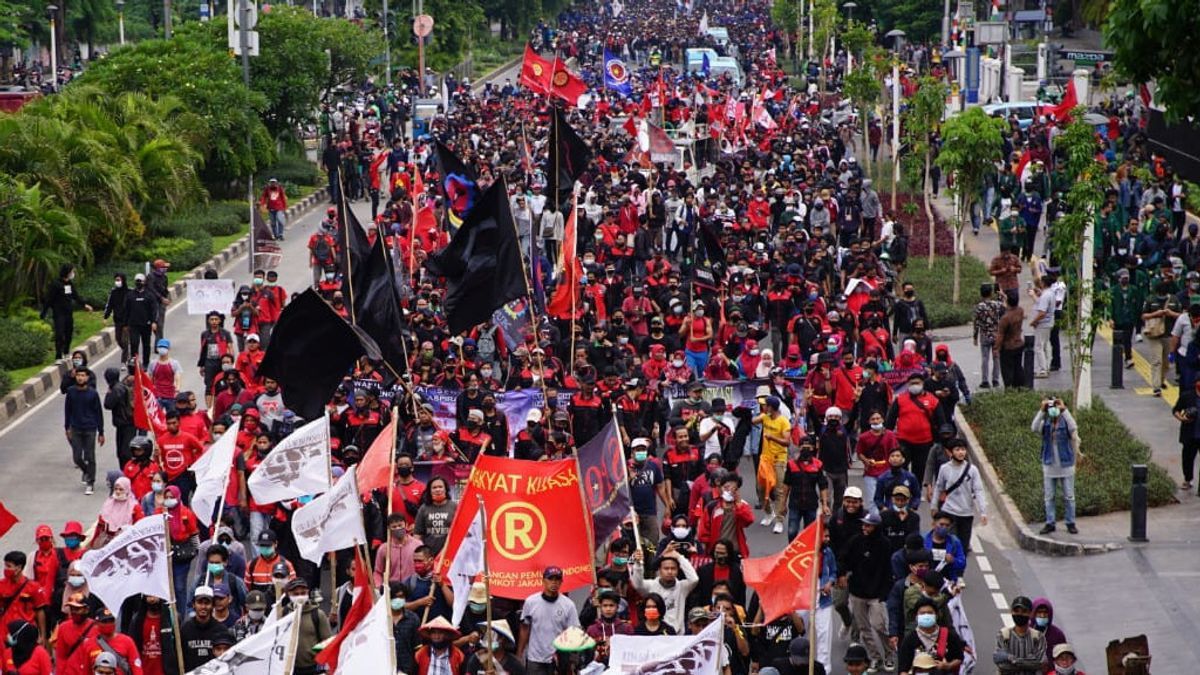YOGYAKARTA - A Government Regulation in Lieu of the Job Creation Law (Perppu) was issued by President Joko Widodo on December 30, 2022. The Perppu received a lot of criticism and rejection from various parties, especially workers or trade union organizations. The public also highlighted the contents of the Job Creation Perppu which were protested by workers.
Some observers assess that the new Perppu contradicts the decision of the Constitutional Court and undermines the good practice of state administration. A number of labor organizations will file a lawsuit against the Perppu to the Constitutional Court. The workers feel that the articles in the employment cluster are still considered detrimental to the position of workers.
Guspardi Gaus, Member of the DPR Baleg and the PAN faction, responded to a number of these protests by inviting workers to file a judicial review lawsuit. Guspardi said that the Perppu was another legitimate step by the Constitutional Court in revising and revising the Job Creation Law.
Said Iqbal, Chairman of the Labor Union/President of the Labor Party, gave reasons why the Labor Party, KSPI, and labor union organizations opposed the contents of Perppu Number 2 of 2022. He said the contents in the Job Creation Perppu were considered detrimental to workers.
"The Labor Party, KSPI, and labor union organizations, farmers' unions, refuse or disagree with the contents of Perppu number 2 of 2022 concerning the omnibus law on job copyright law. But regarding the choice of legal discussion, the Labor Party and the labor union organization agreed to choose Perppu, it was not discussed in the special committee for the legislative body of the DPR RI," said Said Iqbal at a press conference, Sunday (1/1/2022).
There are a number of things that the workers protest, as follows:
The Job Creation Perppu contains the rules regarding wages listed in Article 88C to Article 88F. The district/city minimum wage provisions are considered to have changed to unclear, while the provisions governing sectoral wages are lost.
Article 88C paragraph 1 states that the governor can set the provincial and district/city minimum wage. According to Said Iqbal, the word can't' in legal means can exist or can't depend on the decision of the governor in office.
Paragraphs 4 and 5 contain rules that the minimum wage is determined based on economic and labor conditions whose data comes from an authorized institution in the field of statistics.
"In the event that the regency/city does not have a minimum wage and will determine the minimum wage, the determination of the minimum wage must meet certain conditions," reads paragraph 6.
Meanwhile, the provisions of the procedure for determining the minimum wage will be regulated in Government Regulations (PP). Article 88D states that the minimum wage will be calculated using a formula that takes into account the variables for economic growth, inflation, and certain indexes. Further provisions related to this calculation formula will also be regulated in the PP.
Then the contents of Article 88F state that under certain circumstances the government can set a formula for calculating the minimum wage that is different from the formula for calculating the minimum wage as referred to in Article 88D paragraph 2.
The rules in the Omnibus Law on the Job Creation Law often trigger a series of controversies, namely regarding contract workers or certain time work agreements (PKWT). It is also contained in the Job Creation Perppu.
The Job Creation Perppu in Article 59 that has been amended contains provisions regarding PKWT or contract workers. In paragraph 1 it is stated that PKWT can only be made for certain jobs that according to their type and nature or work activities will be completed within a certain time.
Workers included in these provisions are as follows:
Meanwhile, paragraph 2 states that PKWT cannot be applied for permanent work. There are a number of further provisions regulated in PP, including regarding the types and properties or activities of the work, period of time. and the PKWT deadline.
The Job Creation Perppu also contains provisions that change Article 61. In paragraph 1, for example, stipulates the provisions regarding the termination of the work agreement if:
This is the content of the job creation Perppu which is protested by workers because it is considered detrimental to workers. A number of experts in the field of law and manpower support the lawsuit from the workers. The job creation Perppu is said to have been born because of urgent needs so that it is considered less strong.
Stay up to date with the latest domestic and foreign news on VOI. You present the latest and most recent nationally and internationally.
The English, Chinese, Japanese, Arabic, and French versions are automatically generated by the AI. So there may still be inaccuracies in translating, please always see Indonesian as our main language. (system supported by DigitalSiber.id)













